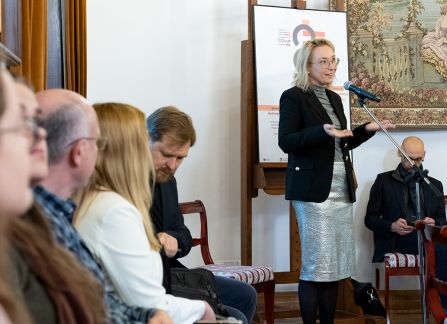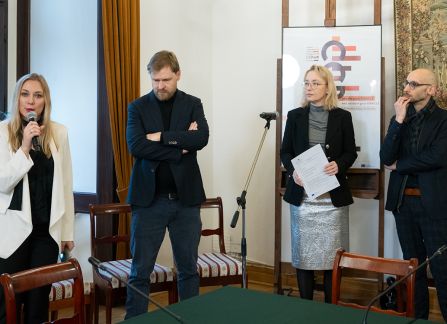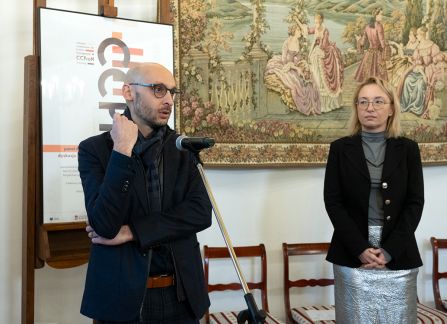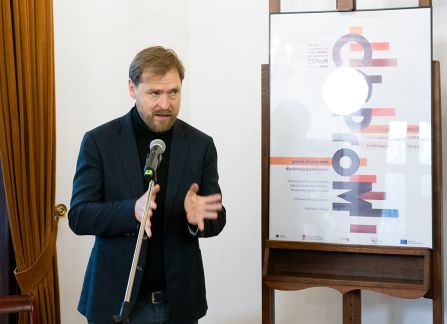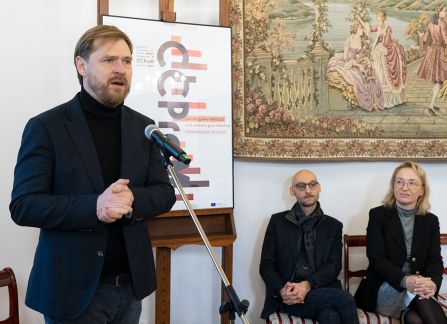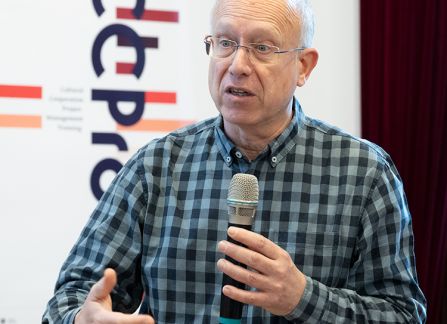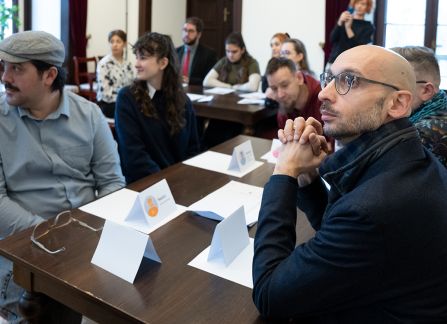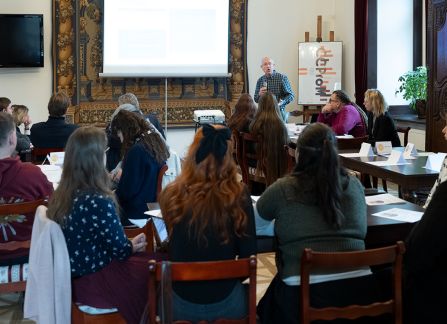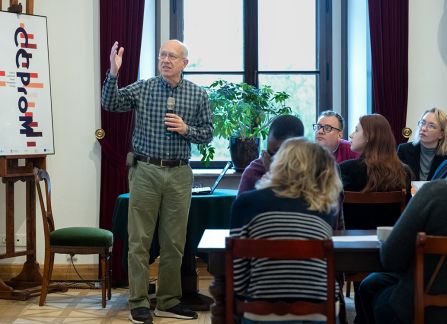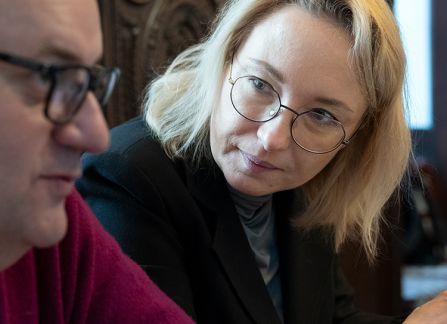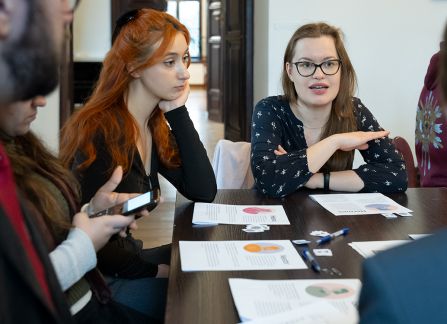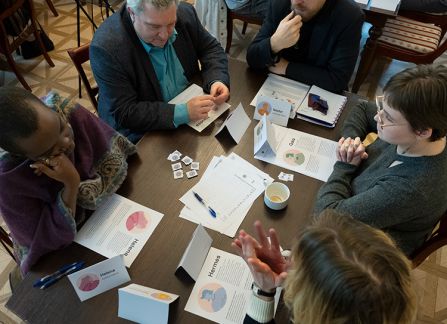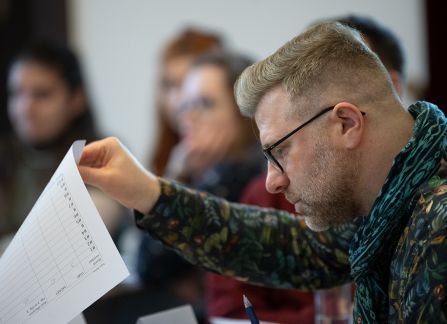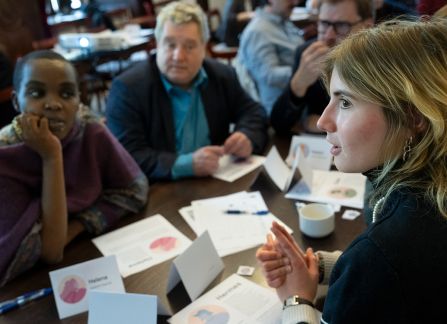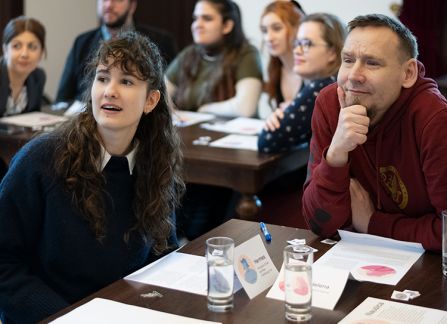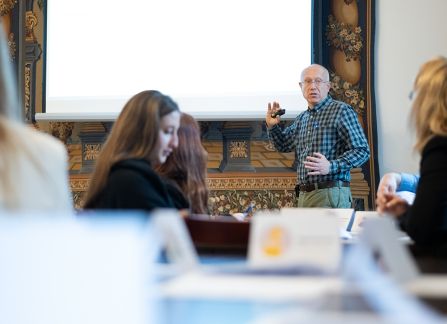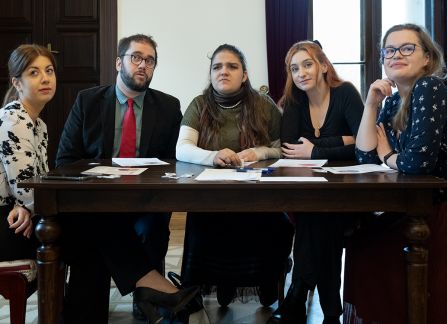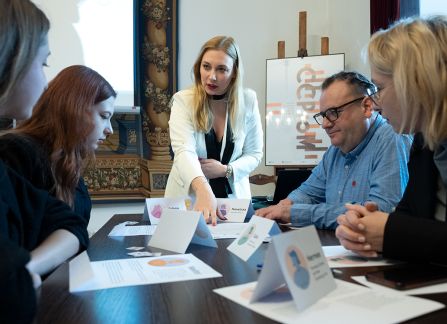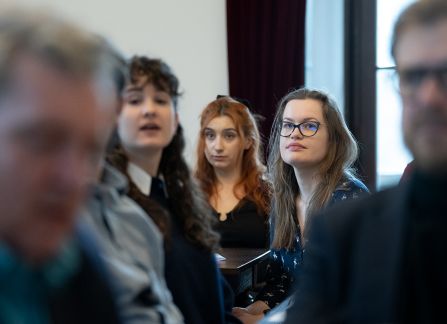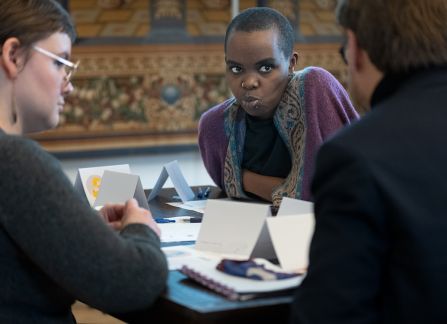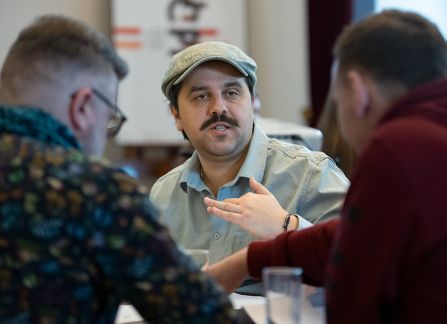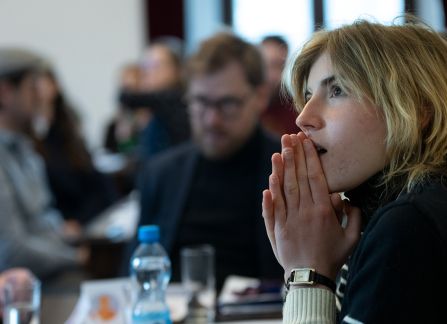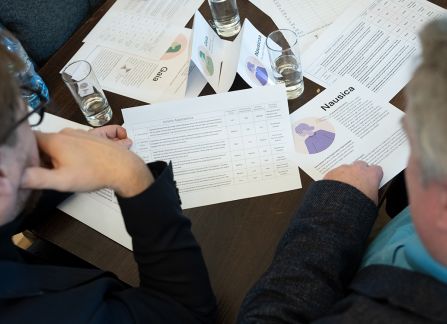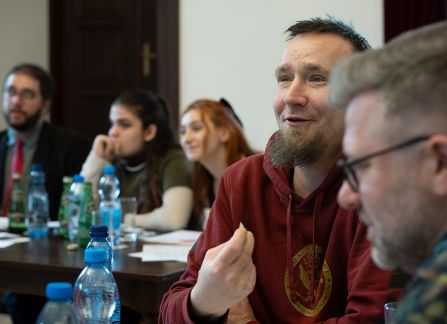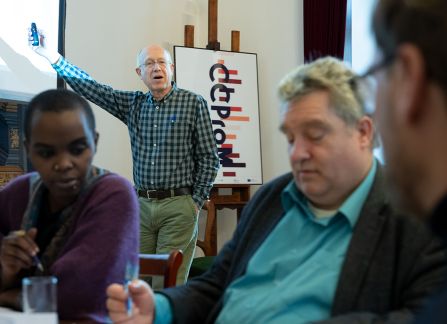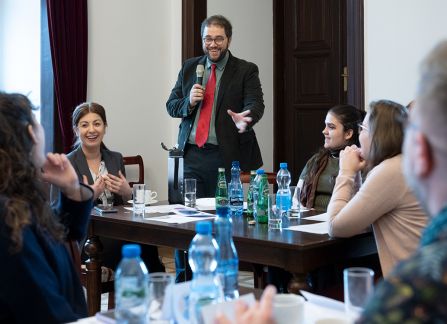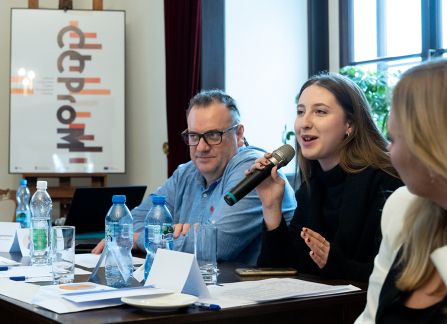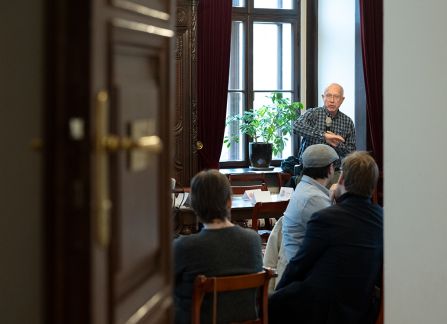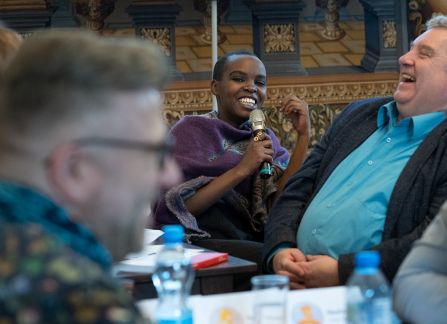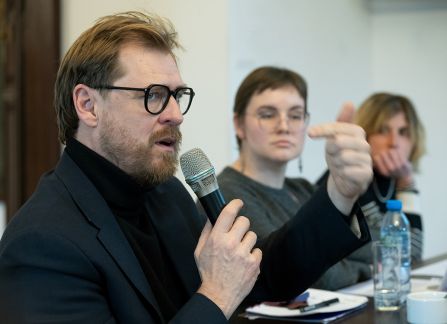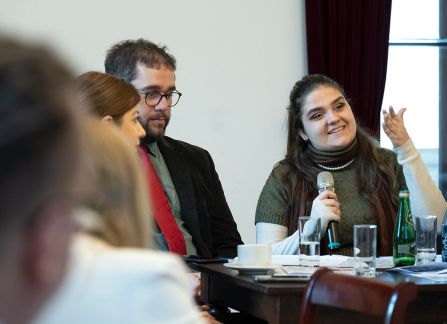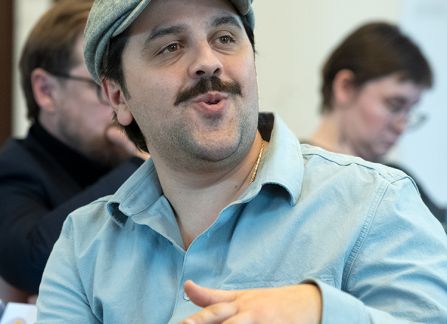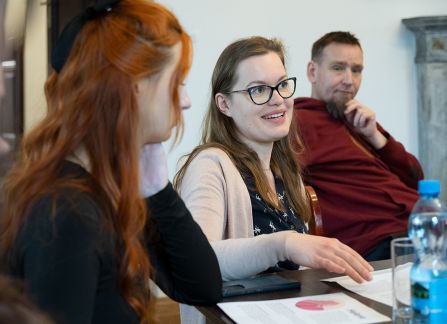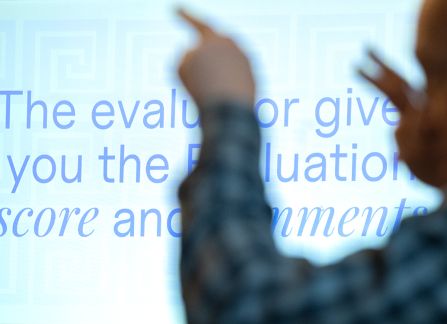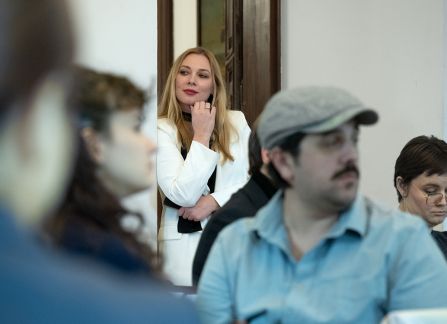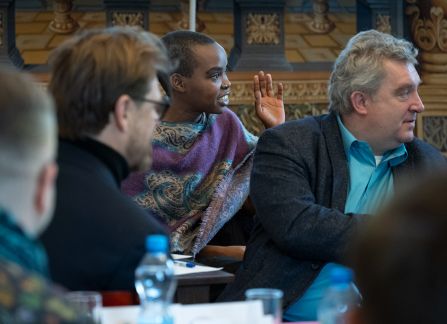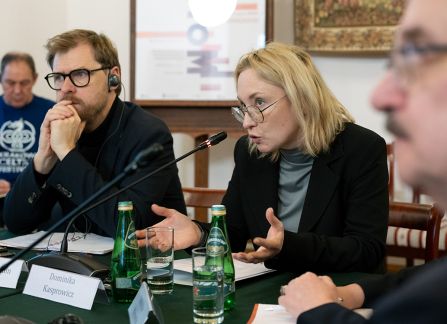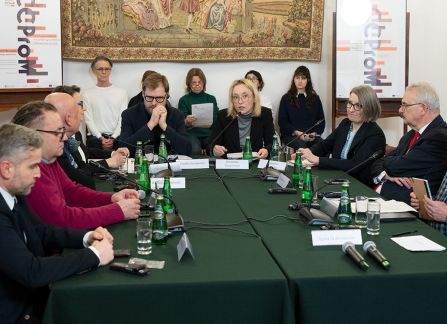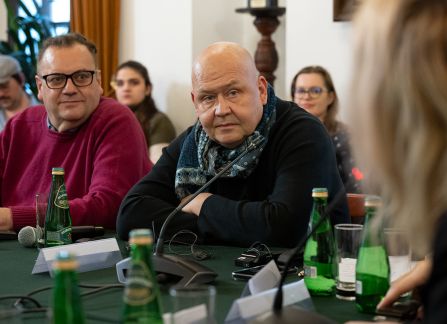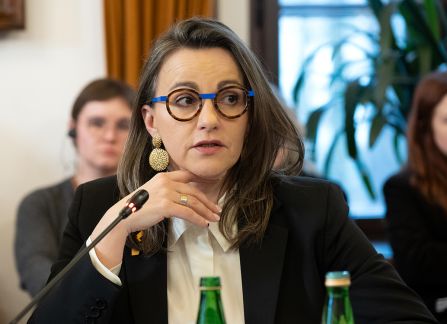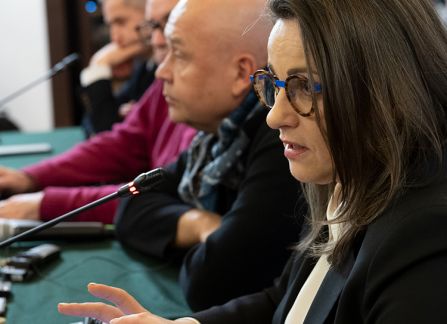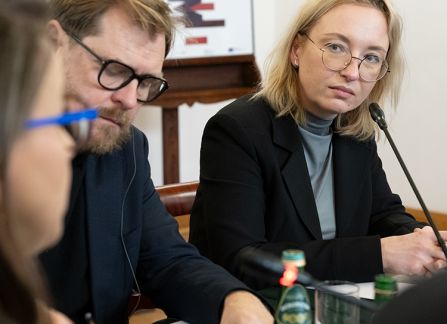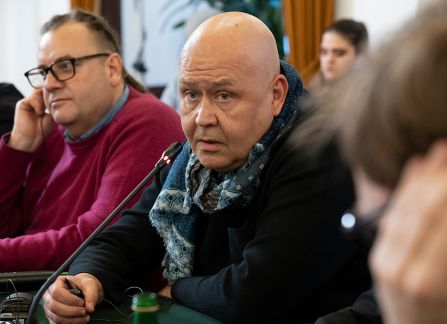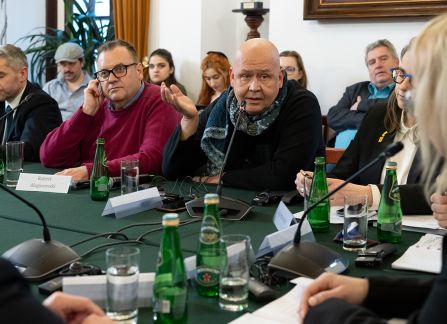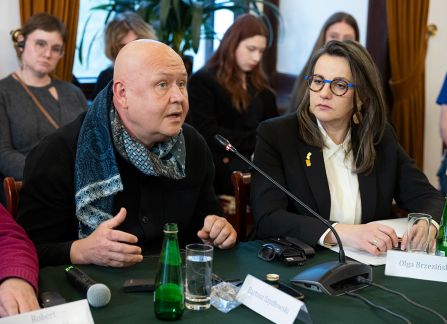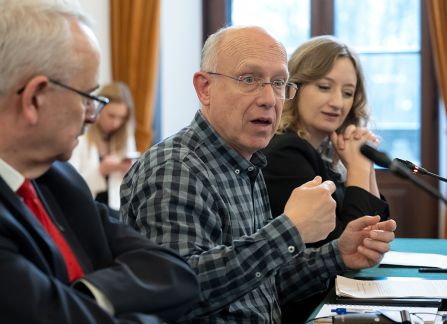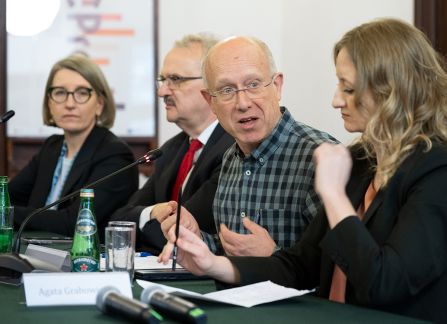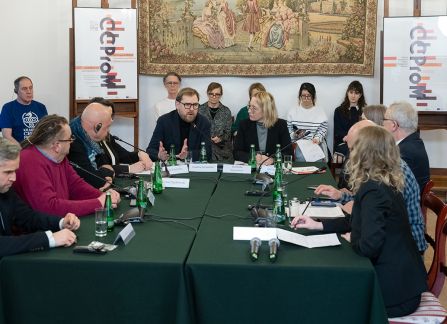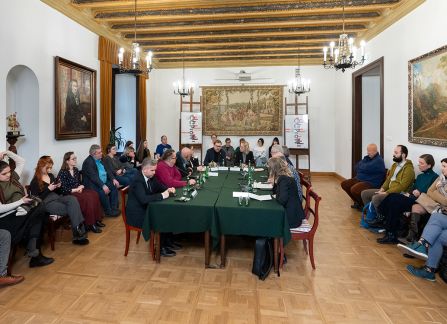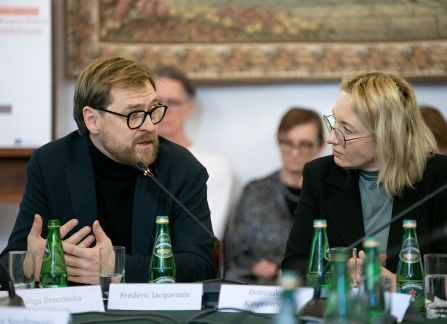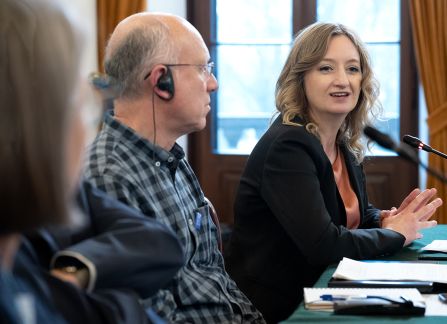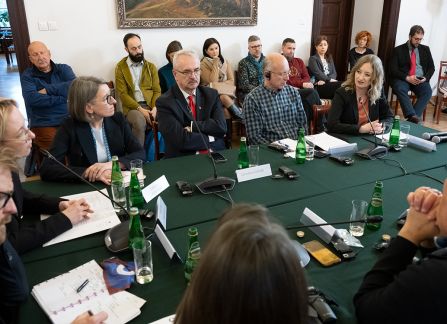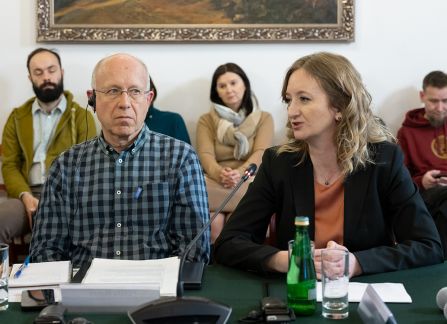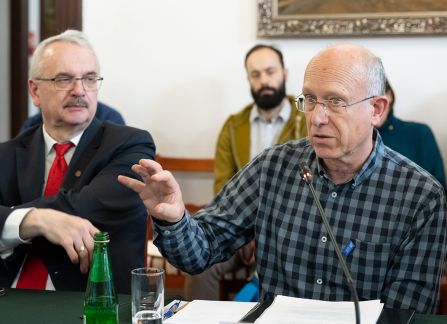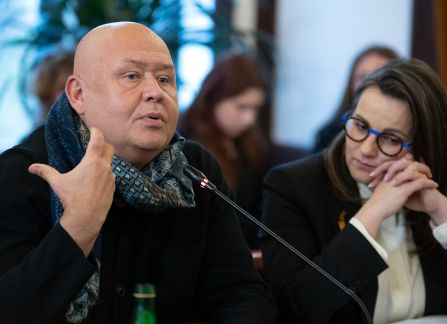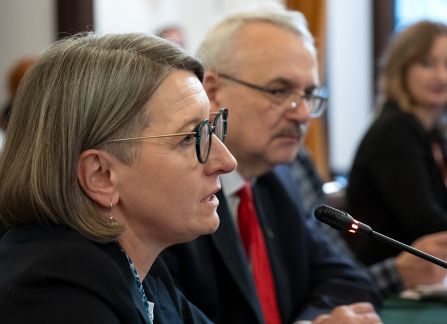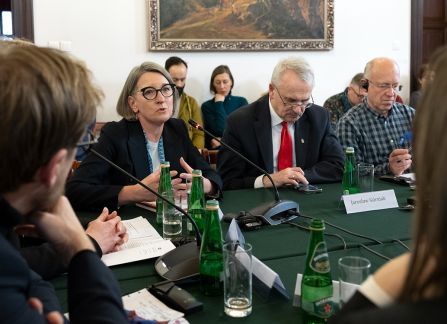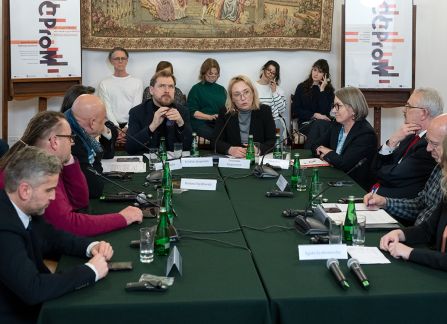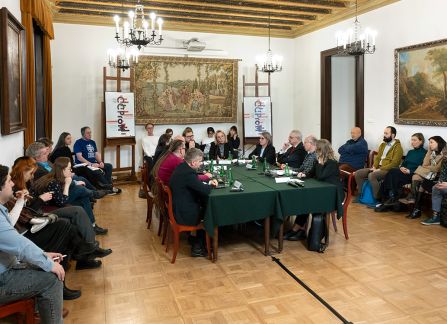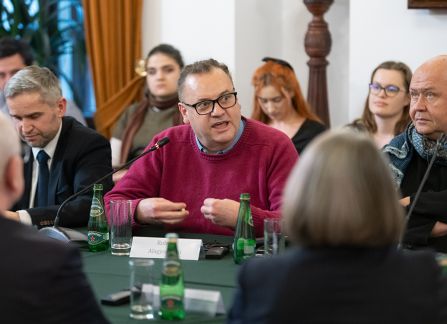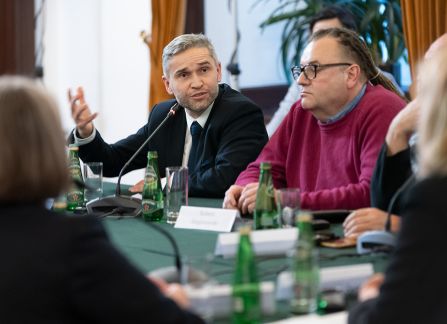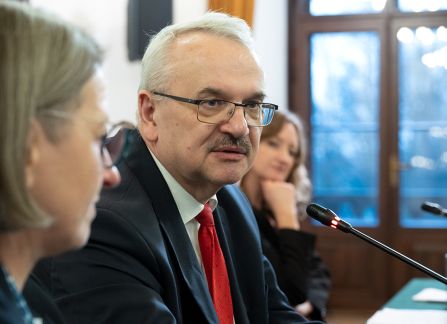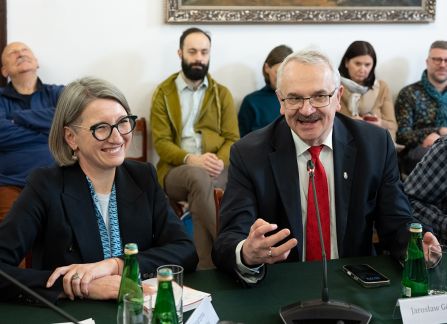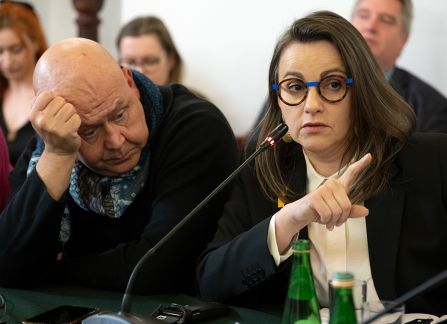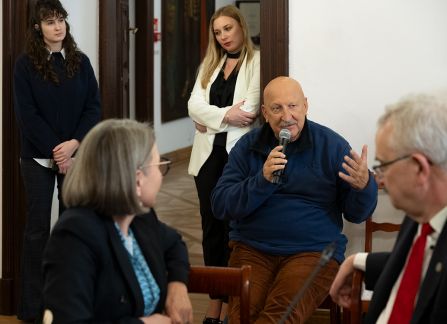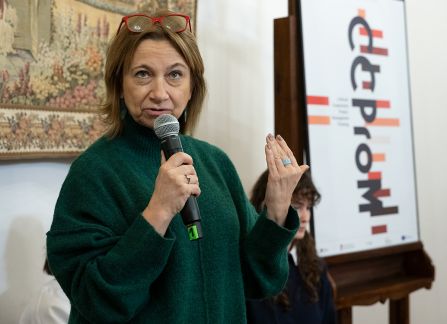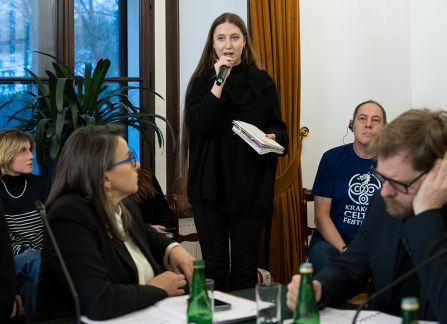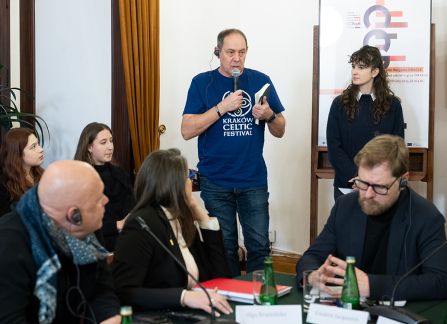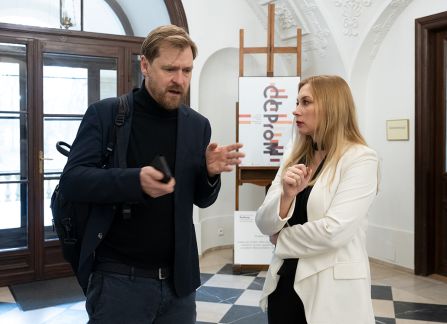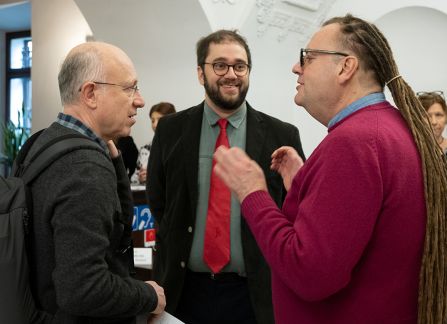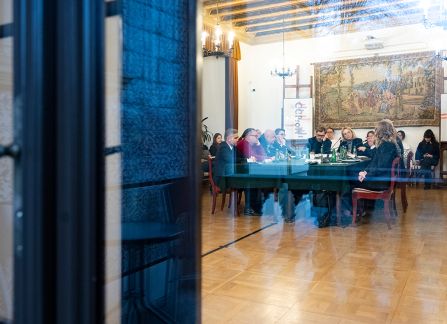International cultural cooperation 07.02.2025
The conference of the CCPRom project is behind us.
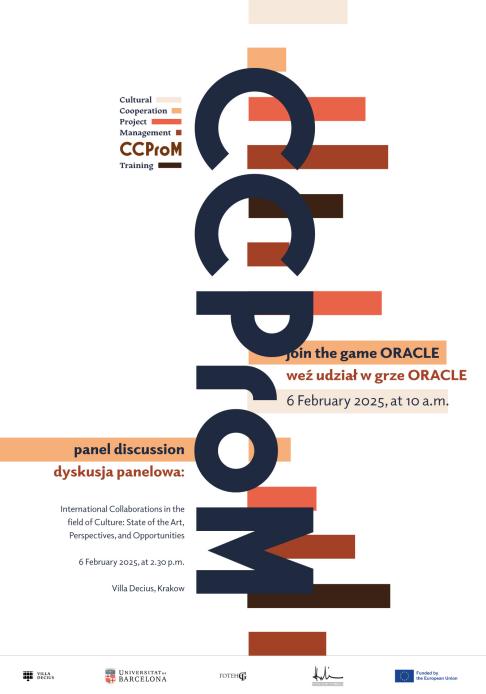
On 6 February, Villa Decius hosted a conference summarising the international project CCProm- Cultural Cooperation Project Management Training, implemented by a consortium of European cultural institutions - the Marcel Hicter Association from Brussels, the University of Barcelona, the Goten publishing house from Skopje and the Villa Decius Institute for Culture.
The conference was opened by Paweł Szczepanik, Plenipotentiary of the Mayor of the City of Cracow for Cultural Affairs, Prof. Dominika Kasprowicz, Director of Villa Decius and Frédéric Jacquemin Director of the Marcel Hicter Foundation.
During the event took place the premiere of the ‘Oracle’ narrative game aimed at students, academics and cultural management professionals, where participants took on the role of members of an international consortium carrying out a cultural project. The game's plot is inspired by characters and themes related to European cultural heritage, particularly Greek mythology. Participants of the game were able to test their project management skills, use their ‘soft’ skills and try out themselves at an international teamwork.
In the second part of the day, a panel discussion ‘International Collaborations in the field of Culture: State of Art, Perspectives, and Opportunities’ took place with the participation of representatives from Polish and European cultural institutions: Katarzyna Piotrowska, Deputy Director of the Department of Culture of the City of Krakow, Olga Brzezińska, Deputy Director of the Adam Mickiewicz Institute, Agata Grabowiecka, Director of Sinfonietta Cracovia, Prof. Jarosław Górniak, Prorector for International Cooperation at the Jagiellonian University, Tomasz Włodarski, Director of the Malopolska Institute of Culture, Bartosz Szydlowski, Director of the Łaźnia Nowa Theatre, Prof. Dominika Kasprowicz, Director of the Villa Decius Institute of Culture, Frédéric Jacquemin, Director of Association Marcel Hicter, fondation pour la démocratie culturelle Director of the Africalia agency for the period 2013-2021, prof. Lluis Bonet, Director of the Cultural Management Programme from Universitat de Barcelona, Robert Alagjozovski, from Goten Publishing, Minister of Culture of North Macedonia from 2018-2019.
The panel discussion was initiated by Olga Brzezińska, who emphasized that Poland currently faces numerous challenges, especially in light of the upcoming Polish Presidency of the Council of the European Union, which holds significant cultural importance. She highlighted the influence of political factors on the cultural sector, particularly regarding the challenges faced by artists and cultural managers in the face of political decisions. She also pointed to the phenomenon of the hyper-instrumentalization of culture, which overshadows its fundamental function—human integration.
Bartosz Szydłowski noted that culture is becoming a victim of competition in the emotional sphere, which, combined with growing populist tendencies, leads to the weakening of international cultural cooperation. He expressed a somber reflection that the European project built over the past three decades is now being questioned—“30 years of faith in openness and exchange are increasingly being countered by the success of populist parties, the demons awakened in the realm of emotions,” said Szydłowski.
Prof. Lluis Bonet, in turn, emphasized that dynamic political changes require culture to adapt to new realities. Education plays a key role in this process, particularly at the university level. The international and multicultural nature of academic environments fosters the exchange of perspectives and experiences. Universities should not only collaborate with artists and experts but also popularize research results in a way that is accessible to a broad audience, promoting the idea of lifelong learning.
Frédéric Jacquemin, Director of the Marcel Hicter Foundation, noted that what has changed the status of cultural cooperation is perceiving it independently of the "genius loci" or spirit of the place, and more as a form of common good on a broader scale. This approach gives rise to the concept of defining culture through the lens of shared goods and services. Such a perspective facilitates the creation of cultural projects that connect different places.
Director Tomasz Włodarski highlighted that culture has firmly established itself on the agenda of European policies, and its role in the EU's multiannual financial framework is currently under discussion.
An important theme in the discussion was the war in Ukraine, which has highlighted the role of culture as a tool for supporting international solidarity, building social resilience, and protecting cultural heritage in times of crisis. Agata Grabowiecka, Director of Sinfonietta Cracovia, emphasized the significance of culture as both a means of international pressure and a carrier of ideas, noting that Sinfonietta Cracovia is one of the few orchestras in Europe that does not perform Russian music as a protest against Russia's aggression towards Ukraine.
The discussion also touched on topics related to the circulation of culture in Europe, whose nature is ambivalent—on one hand, it drives development, while on the other, it promotes a single model of cultural coexistence that becomes the desired standard. The role of cultural ecosystems—environments where cultural exchange occurs—was also highlighted. Prof. Jarosław Górniak, Vice-Rector for International Relations at the Jagiellonian University, emphasized the role of the university in this context, as both an artifact and part of artistic culture, a component of Europe’s cultural heritage, and an environment actively initiating cultural partnerships. The Jagiellonian University currently maintains 276 bilateral agreements with universities from 76 countries.
In conclusion, the panelists agreed that despite the challenges arising from dynamic political and social changes, culture remains a key tool for building bridges between people and nations. International cooperation, openness to diversity, investments in cultural education, and support for cultural partnerships are the foundations that will help address contemporary challenges and strengthen the values of European solidarity and intercultural dialogue.
The conference was opened by Paweł Szczepanik, Plenipotentiary of the Mayor of the City of Cracow for Cultural Affairs, Prof. Dominika Kasprowicz, Director of Villa Decius and Frédéric Jacquemin Director of the Marcel Hicter Foundation.
During the event took place the premiere of the ‘Oracle’ narrative game aimed at students, academics and cultural management professionals, where participants took on the role of members of an international consortium carrying out a cultural project. The game's plot is inspired by characters and themes related to European cultural heritage, particularly Greek mythology. Participants of the game were able to test their project management skills, use their ‘soft’ skills and try out themselves at an international teamwork.
In the second part of the day, a panel discussion ‘International Collaborations in the field of Culture: State of Art, Perspectives, and Opportunities’ took place with the participation of representatives from Polish and European cultural institutions: Katarzyna Piotrowska, Deputy Director of the Department of Culture of the City of Krakow, Olga Brzezińska, Deputy Director of the Adam Mickiewicz Institute, Agata Grabowiecka, Director of Sinfonietta Cracovia, Prof. Jarosław Górniak, Prorector for International Cooperation at the Jagiellonian University, Tomasz Włodarski, Director of the Malopolska Institute of Culture, Bartosz Szydlowski, Director of the Łaźnia Nowa Theatre, Prof. Dominika Kasprowicz, Director of the Villa Decius Institute of Culture, Frédéric Jacquemin, Director of Association Marcel Hicter, fondation pour la démocratie culturelle Director of the Africalia agency for the period 2013-2021, prof. Lluis Bonet, Director of the Cultural Management Programme from Universitat de Barcelona, Robert Alagjozovski, from Goten Publishing, Minister of Culture of North Macedonia from 2018-2019.
The panel discussion was initiated by Olga Brzezińska, who emphasized that Poland currently faces numerous challenges, especially in light of the upcoming Polish Presidency of the Council of the European Union, which holds significant cultural importance. She highlighted the influence of political factors on the cultural sector, particularly regarding the challenges faced by artists and cultural managers in the face of political decisions. She also pointed to the phenomenon of the hyper-instrumentalization of culture, which overshadows its fundamental function—human integration.
Bartosz Szydłowski noted that culture is becoming a victim of competition in the emotional sphere, which, combined with growing populist tendencies, leads to the weakening of international cultural cooperation. He expressed a somber reflection that the European project built over the past three decades is now being questioned—“30 years of faith in openness and exchange are increasingly being countered by the success of populist parties, the demons awakened in the realm of emotions,” said Szydłowski.
Prof. Lluis Bonet, in turn, emphasized that dynamic political changes require culture to adapt to new realities. Education plays a key role in this process, particularly at the university level. The international and multicultural nature of academic environments fosters the exchange of perspectives and experiences. Universities should not only collaborate with artists and experts but also popularize research results in a way that is accessible to a broad audience, promoting the idea of lifelong learning.
Frédéric Jacquemin, Director of the Marcel Hicter Foundation, noted that what has changed the status of cultural cooperation is perceiving it independently of the "genius loci" or spirit of the place, and more as a form of common good on a broader scale. This approach gives rise to the concept of defining culture through the lens of shared goods and services. Such a perspective facilitates the creation of cultural projects that connect different places.
Director Tomasz Włodarski highlighted that culture has firmly established itself on the agenda of European policies, and its role in the EU's multiannual financial framework is currently under discussion.
An important theme in the discussion was the war in Ukraine, which has highlighted the role of culture as a tool for supporting international solidarity, building social resilience, and protecting cultural heritage in times of crisis. Agata Grabowiecka, Director of Sinfonietta Cracovia, emphasized the significance of culture as both a means of international pressure and a carrier of ideas, noting that Sinfonietta Cracovia is one of the few orchestras in Europe that does not perform Russian music as a protest against Russia's aggression towards Ukraine.
The discussion also touched on topics related to the circulation of culture in Europe, whose nature is ambivalent—on one hand, it drives development, while on the other, it promotes a single model of cultural coexistence that becomes the desired standard. The role of cultural ecosystems—environments where cultural exchange occurs—was also highlighted. Prof. Jarosław Górniak, Vice-Rector for International Relations at the Jagiellonian University, emphasized the role of the university in this context, as both an artifact and part of artistic culture, a component of Europe’s cultural heritage, and an environment actively initiating cultural partnerships. The Jagiellonian University currently maintains 276 bilateral agreements with universities from 76 countries.
In conclusion, the panelists agreed that despite the challenges arising from dynamic political and social changes, culture remains a key tool for building bridges between people and nations. International cooperation, openness to diversity, investments in cultural education, and support for cultural partnerships are the foundations that will help address contemporary challenges and strengthen the values of European solidarity and intercultural dialogue.


